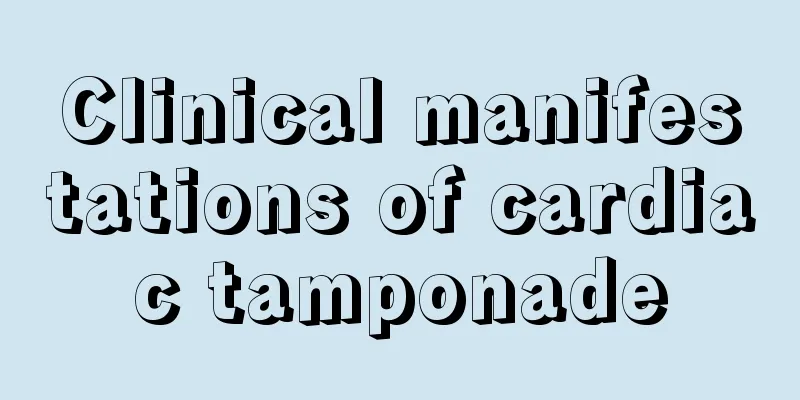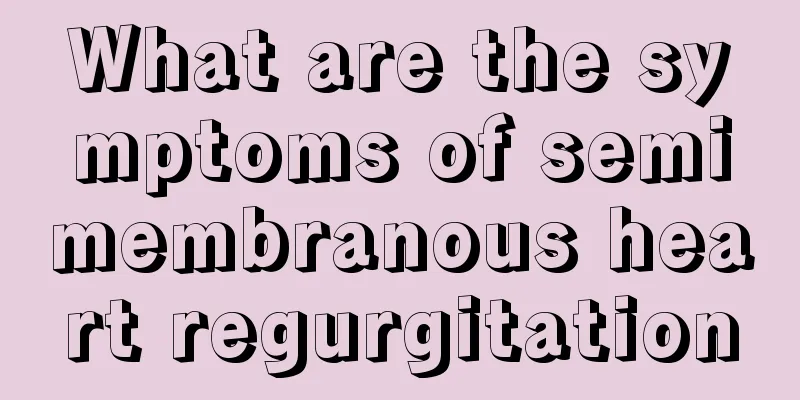Clinical manifestations of cardiac tamponade

|
The heart is the most central organ in the human body. All activities in the human body can only continue when the heart works normally. The pericardium is to protect the heart, so there must be no problems with the pericardium. The general clinical manifestations of pericardial tamponade are slow and weak heartbeat and decreased arterial pressure. Once pericardial tamponade occurs, it must be treated in time, otherwise it will be life-threatening. Below we will introduce to you in detail the clinical manifestations of cardiac tamponade. The heart is the power organ that maintains the human body's blood circulation. It ensures the blood supply to all organs and tissues in the body. The pericardium is a sac-like structure that surrounds the heart and the roots of the large blood vessels entering and leaving the heart. The pericardial cavity refers to the space between the parietal pericardium and the visceral pericardium on the surface of the heart. Normally there is a small amount of yellowish fluid in the pericardial cavity that lubricates the surface of the heart. Traumatic heart rupture or pericardial vascular damage causes blood accumulation in the pericardial cavity, which is called hemopericardium or cardiac tamponade and is a rapid cause of death from cardiac trauma. Due to the limited elasticity of the pericardium, acute pericardial hemorrhage of up to 150 ml can limit blood return to the heart and heartbeat, causing acute circulatory failure and ultimately leading to cardiac arrest. Treatment Therefore, once hemopericardium appears, emergency treatment must be carried out as soon as possible. When the chest wall wound caused by sharp weapon is in the precordial area or the patient with chest compression injury has progressive drop in blood pressure, pale face, increased heart rate, distant heart sounds, distended jugular veins, and restlessness, the presence of hemorrhagic pericardium should be considered first. Pericardiocentesis should be performed urgently to drain blood and reduce pressure, relieve tamponade, temporarily improve hemodynamics, buy time for rescue, and transfuse saline and blood to correct hemorrhagic shock. At the same time, prepare for emergency thoracotomy, strictly manage anesthesia, prevent cardiac arrest, replenish enough blood, clear blood in the pericardial cavity during the operation, restore the normal contraction and relaxation function of the heart, and repair the damaged part of the heart precisely and accurately. Closely monitor cardiac function after surgery and use cardiovascular active drugs appropriately. Symptoms and Signs (1) Fibrinous pericarditis: ① Pain in the precordial area, sternum or under the xiphoid process is the main symptom. It may be mild discomfort, pressure or sharp pain. The pain may radiate to the edge of the trapezius muscle, left shoulder, arm, and back. It may be aggravated by coughing, deep breathing and lying flat, and may be relieved in the forward bending position. ②Pericardial friction sound is an important physical sign. It is clearest between the 3rd and 4th intercostal spaces on the left side of the sternum and is easily heard when sitting forward. (2) Exudative pericarditis: due to compression of the heart and adjacent organs, often with: ① Discomfort in the precordial area, dyspnea, cough, nausea, upper abdominal distension and pain, hoarseness and dysphagia, etc. ②Physical signs vary depending on the amount of effusion. The apex beat is weakened or absent. The cardiac dullness boundary expands to both sides, and the relative dullness boundary disappears. The heart rate is fast and the heart sounds are weak and distant. ③ There are often fever, shortness of breath, dry cough, hoarseness, difficulty swallowing, etc. In addition, there may be stuffiness in the precordial area or upper abdomen, fatigue, irritability, etc. When there is a large amount of effusion, percussion of the left subscapular region is dull, vocal fremitus is enhanced, and tubular breath sounds, also known as Ewert's sign, may be heard. The pulse is weak and there is a strange pulse. Systolic blood pressure decreases and pulse pressure decreases. Subacute or chronic pericarditis may present with distended jugular veins, positive hepatojugular reflux, hepatomegaly, subcutaneous edema, and ascites. (3) Acute cardiac tamponade: Due to a large amount of pericardial effusion or a rapidly growing small amount of effusion, ventricular diastole is obstructed and cardiac output is reduced. The clinical manifestations are acute circulatory failure, such as decreased blood pressure, increased heart rate, dyspnea, cyanosis, pale complexion, sweating, and distended neck veins. |
<<: Symptoms of severe skin dehydration
>>: What symptoms can stomach cold cause
Recommend
Why is sweat salty
People often say that sweat is the "air cond...
The advantages and disadvantages of wearing a crown
Teeth are very important to everyone. So if there...
Can oranges reduce internal heat?
Orange is a kind of fruit that we often eat in ou...
How much does it cost to treat lung cancer in the early stages?
How much does it cost to treat early-stage lung c...
Common vegetable names
Vegetables are a type of food we often eat. There...
What is the nutritional value of raisins
Raisins are actually grapes that are dried and pa...
Difference between wrist dislocation and sprain
Dislocation is caused by the separation of the co...
Long-term illness should be guarded against major diseases
Autumn and winter are the peak seasons for respir...
Can kidney yin deficiency be treated with moxibustion?
Everyone's physique is different, and people ...
What are the recipes to improve immunity
In different seasons, especially in winter, our b...
The treatment of lymphoma is mainly based on combined chemotherapy
Lymphoma is the most common disease around us, so...
What is the best way to treat a patient with advanced brain cancer who has a fever and feels weak all over?
What is the best way to treat fever and lack of s...
The difference between ponkan and orange
With the development of social economy and transp...
How to drain pus if you don’t squeeze the pimple?
Acne will show signs of pus in the later stages o...
How long does it take for thyroid cancer to develop into stage I?
It usually takes 1-2 years for thyroid cancer to ...









